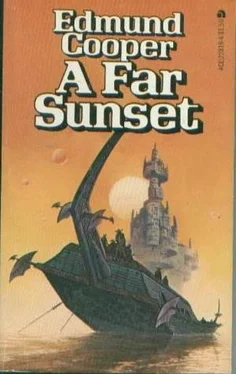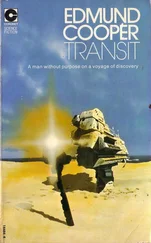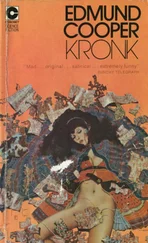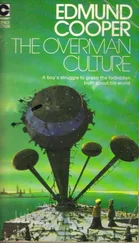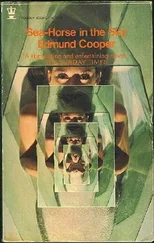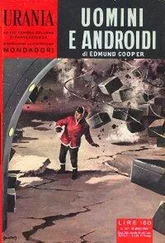Poul Mer Lo perched himself on top of the small cart and waited patiendy. The two Bayani muttered briefly to each other and urinated where they stood. He had witnessed such a ritual many times. It was the way in which a low-caste Bayani anticipated sin by giving himself absolution beforehand.
Presently, having touched hands and shoulders, the two men took a shaft each and began to draw the cart slowly along the Road of Travail towards the Third Avenue of the Gods. Poul Mer Lo waved cheerily to Mylai Tui.
‘Oruri be with you,’ she called, ‘at the end as at the beginning.’
‘Oruri be with you always,’ responded Poul Mer Lo. Then he added informally: ‘Let there be the paint of dancing upon you this night. Then shall pleasure visit us both.’
It was a fine morning. The air was clear and warm but not heavy. As Paul Mer Lo sat on his cart, listening to the squeaky protest of the wooden wheels against the stone axle-tree, he felt at peace with the world.
A light wind was blowing in from the forest. It carried scents that were still strange and intoxicating to him. It carried the incense of mystery, the subtle amalgam of smells that made him feel almost at times that he was the most fortunate man in the universe. Here, indeed, was the farther shore. And his footprints were upon it.
Presently, the cart overtook a group of early morning hunters returning to the city, laden with their kill. They gazed at the vehicle in amazement. Poul Mer Lo smiled at them gaily.
‘Oruri greets you,’ he said.
‘The greeting is a blessing,’ they returned.
‘Lord,’ said one, ‘what is the thing upon which you sit and which men may move so easily?’
‘It is a cart. It runs on wheels. With the grace of Enka Ne, soon you will be carrying your meat to Baya Nor on carts. Soon the people of Baya Nor will learn to ride on wheels.’
‘Lord,’ said the hunter, perplexed, ‘truly it is a wondrous thing. I pray only that it may be blessed by a sign.’
‘What sign?’
‘Lord, there is only the sign of Oruri.’
The cart had now reached the end of the Road of Travail, and the broad dirt track gave way to the broader and stone paved Third Avenue of the Gods. The wheels rattled noisily over the cobblestones. There were more people about—city people, sophisticated Bayani, both high and low bom, who gazed at Poul Mer Lo with a mixture of what he interpreted as amusement and awe.
He would have been more accurate if he had interpreted the smiling stares as antagonism and awe. But he was not aware of the antagonism until it was too late.
The cart was already half across the causeway leading to the sacred city. By this time it had collected a retinue of more than fifty Bayani. This, in itself, was not unfortunate.
What was unfortunate was that Poul Mer Lo should encounter one of the blind black priests and that the wheels of the cart should pass over his bare toes.
The priest screamed and tore the hood from his face.
His eyes, unaccustomed to daylight, were screwed up painfully for quite a long time before he was able to focus on Poul Mer Lo.
‘Oruri will destroy! ’ he shouted in a loud voice. ‘This thing is an affliction to the chosen. Oruri will destroy! ’
There was a dreadful silence. Poul Mer Lo gazed at the hoodless priest uncomprehendingly.
Then somebody threw the first stone. It bounced off the cart harmlessly. But it was a signal.
More stones came. The crowd began to rumble. Part of the causeway itself was torn up as ammunition.
‘Oruri speaks! ’ screamed the priest.
And then the stones began to fall like giant hail.
‘Stop! ’ shouted Poul Mer Lo. ‘Stop! The cart is a gift for Enka Ne.’
But the woodcutter, holding one of the shafts, had already been struck in the small of the back by a sharp piece of rock. He fell, bleeding. The mason abandoned his shaft and tried to flee. The crowd seized him.
‘Stop!’ shouted Poul Mer Lo. ‘In the name of Enka Ne,
I ’
He never finished the sentence. A strangely heavy round pebble, expertly aimed by a child on the fringe of the crowd, caught him on the forehead. He went down with the sound of a great roaring in his ears.
Poul Mer Lo was aware of an intense, throbbing pain. He opened his eyes. He was in a room to which there seemed to be no windows. Here and there, smoky oil lamps burned in niches in the stone walls.
He felt cold.
He tried to move, and could not.
He was chained to a stone slab.
A Bayani with a white hood over his face leaned over the slab and peered through narrow eye-slits. ‘The spirit has returned,’ he announced to someone outside Poul Mer Lo’s field of vision. ‘Now the stranger will speak.’
‘Who—who are you? What am I doing here? What happened?’
‘I am Indrui Sa, general of the Order of the Blind Ones. You are Poul Mer Lo, a stranger in this land, quite possibly an instrument of chaos.’
‘Where are the two men who were with me?’
‘Dead.’
‘What happened to them?’
‘Oruri crushed them to his bosom. Stranger, they were the victims of chaos. Speak of them no more. Their names are undone. Their fathers had no sons. Their sons had no fathers. They are without meaning … But you, stranger, you Oruri did not take. Oruri looked upon you but he did not take you. This we must understand.’
‘I was going to Enka Ne in the sacred city. I was taking him the cart I had caused to be built.’
‘Enka Ne had called you?’
‘No,’ answered Poul Mer Lo.
‘Help him,’ said the Bayani in the hood.
From out of the gloom another dark shape advanced.
Poul Mer Lo felt the sudden touch of cold metal on his stomach. Then he screamed.
He gazed, horrified, at the pincers gripping a large fold of his flesh.
‘I grieve for you,’ said Indrui Sa. ‘The god-king receives only those who are called … Help him! ’
The pincers were tightened and twisted. Poul Mer Lo screamed again.
‘Thus, perhaps, Oruri hears your sorrow,’ said Indrui Sa. ‘It may be that your ignorance and presumption will inspire some mercy … Stranger, you rode not upon an animal but upon that which had been built by the hand of man. How call you this thing?’
‘It is a cart.’
‘Help him!’
Again the pincers were tightened and twisted. Again Poul Mer Lo screamed.
‘The kayrt is no more. Oruri saw fit to destroy it. What did you hope to encompass with this kayrt?’
‘It was a gift,’ sobbed Poul Mer Lo. ‘It was a gift to Enka Ne. I thought—I thought that if the god-king saw the use to which the cart could be put, he would cause many of them to be built. Thus would the toil of men be greatly eased.’
‘Stranger,’ said Indrui Sa, ‘human toil is the gift of Oruri. Let no man diminish that gift… Help him.’
Once more the pincers tightened and twisted. Poul Mer Lo screamed and fainted. When he became conscious once more, Indrui Sa was still speaking. He sounded as if he had been speaking a long time.
‘And therefore,’ said Indrui Sa, ‘it is clear, is it not, that you were the uncomprehending instrument of chaos. Two men have been destroyed, the kayrt has been destroyed and the foot of the priest will require much rest. Repent, Poul Mer Lo, of ignorance. Repent also of presumption. Give thanks to Oruri for the blessing of a speedy death which, bearing in mind the degree of chaos you have already inspired is more than ’
Suddenly there was a wild desolate bird cry.
Instantly Indrui Sa stopped speaking and fell upon his face.
Poul Mer Lo heard a rustling and saw a bright, darting bird’s head and brilliant plumage that glistened even in the lamplight.
‘Who speaks of death?’ asked a high, reedy voice.
Читать дальше
